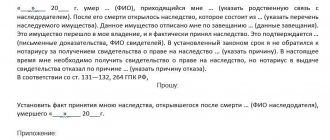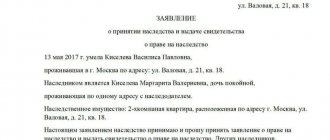Receiving an inheritance is fair compensation for the work of caring for an elderly relative. Real estate or movable property may end up in hands unexpectedly, but also fairly, through the distribution of property between relatives. The deceased's will may contain instructions for the disposition of what he or she owned.
But, just like any acquisition is subject to tax, receiving new property may also be subject to tax liability.
What taxes are paid under a will in Russia for the current year? If apartments are transferred to new owners by will, do they need to pay tax and in what amount? Are there any benefits for such contributions to the budget for citizens of the Russian Federation, and in what amount?
Let's figure it out in detail, who is obliged to pay money to the budget so as not to create risks for themselves in litigation with the state? What rules for paying taxes on assets received as a gift from the testator are provided for in Russia in 2021.
Dear readers!
Our articles talk about typical ways to resolve legal issues, but each case is unique. If you want to find out how to solve your specific problem, please contact the online consultant form on the right →
It's fast and free!
Or call us by phone (24/7):
If you want to find out how to solve your particular problem, call us by phone. It's fast and free!
+7 Moscow,
Moscow region
+7 Saint Petersburg,
Leningrad region
+7 Regions
(free call for all regions of Russia)
Inheritance tax under a will: general information
Innovations in legislation have freed citizens from will tax. Now such a source of state income does not exist. However, small payments will have to be made. The term “state duty” actually replaced tax payment for new owners of land, commercial office, private residential apartment.
The most important criterion is the price of the inherited object. The more expensive what is acquired through inheritance rights, the higher the rate. However, the law established a maximum level of payment and created a significant category of beneficiaries who have the right not to pay this contribution to the state.
Do I need to pay tax when entering into an inheritance?
The law obliges you to pay tax upon entering into an inheritance only in the form of a state duty. The most common case of paying money when entering into an inheritance under a will is payment of a percentage of the inherited real estate. This percentage is paid with a maximum threshold, but not less than 0.5-0.8% of the assessed value of the house or apartment.
More details about how much and in what amount the new owner must pay upon receipt of inheritance of real or movable property, as well as about exceptions to the rules, are further in the publication.
Under no other circumstances do minors pay for obtaining documents on the right to own an inheritance. This category, especially protected by law, includes citizens-heirs who suffer from mental illness and who are cared for on the basis of legislative rights and restrictions by individuals or special medical institutions.
Who is charged inheritance tax?
Formally, no one pays such a tax. Tax obligations for recipients of inheritance of any level of relationship are excluded from the legislative circulation of the federation. Another thing is that you will have to pay money to receive it from the testator or according to the rules of inheritance by law. Therefore, if we answer, in essence, the question of whether inheritance is taxable, the answer will be positive.
Despite the fact that the payments are not intended for recipients of new property, for the very fact of its acquisition, money will have to be paid for registration. The amount of such payment is insignificant if we are talking about a standard house or apartment with several rooms.
The average price of an apartment in the capital is about 200 thousand rubles. Without delving into the details of the calculation, which we will show below, we note that without benefits, the duty amount will be 1,200 rubles. Plus you will have to pay for some other notary services. The price of services will not exceed 2-2.5 thousand rubles.
Owners of inheritance in the form of multi-storey cottages or premium cars will pay more.
It is necessary to distinguish between receiving property from the testator according to a drawn up, legally certified will and according to the norms of the law. The first option involves paying only state fees for legalizing documents and performing simple notarial actions:
- for announcing the text of the will and the official opening of the object with the text;
- for documents of protection for inherited property;
- for obtaining a document confirming the rights of heirs along different lines of kinship.
Who is exempt from paying state duty
Are there certain categories of citizens who do not pay state duty? Yes, there are such categories and in some cases the benefit is 100%.
Disabled people of the first and second groups, regardless of obligations and degree of relationship, receive a 50% discount.
100% exemption is provided for the testator's inner circle when receiving a certificate of property:
- for the land under the property and the house or apartment itself (part thereof), if the citizens were living at the time of the death of the testator and continue to live in the house/apartment;
- for deposits and other assets in banking institutions;
- salary of the deceased, pension;
- insurance payments;
- copyright and other payments for intellectual work and inventions.
Special categories of citizens whose property, when transferred to heirs, is not subject to tax obligations:
- citizens who died fulfilling their duty to the country, fulfilling their duties within the framework of the law;
- citizens died saving people, protecting law and order, state property;
- citizens subjected to political repression;
- those who died as a result of concussion or injury in these situations, but not later than a year;
- citizens served in the troops of the Russian Federation or the National Guard, the Ministry of Internal Affairs, if they died in the line of duty or were injured a year after the events.
Normative base
There is no tax to be paid when receiving property - movable or immovable. The state does not oblige you to do this. You can read more about this in the articles of the Tax Code of the Federation:
- Article 217, paragraph 17.1, which provides a detailed list of exceptions for the payment of tax obligations, including exemption from tax payments when receiving part or all of the property;
- Article 217.1 specifies the specifics of acquiring tax benefits, including for citizens who received an inheritance under inheritance law (third paragraph).
Article 217 contains an important exception. When receiving an inheritance in the form of an apartment, a commercial building or a car for running a business, everything is taxed in the same way as any other ordinary commercial acquisition and is not subject to preferential treatment.
An important component of Russian legislation for property recipients is the part of the Tax Code that establishes the amount of duties that are paid to the state for certain actions. We are talking about the formal legalization of wills or documents on the right to own property, according to the law. This is Article 333.24 of the Tax Code as amended. It is important to consider the new rules of law that are valid at the time of opening of the inheritance for making decisions and paying amounts.
Legal practice
In practice, each case is unique. Different regions and areas, distance from cities complicates the registration of inheritance. Court cases are not uncommon. The notary gives six months for the heirs to show up and declare their rights, but this is not always possible in practice, since the heirs themselves may be in serious medical condition. Such cases are considered through the courts .
The cost of the object also plays an important role. If the apartment in the city center is in good repair, and there are no more than ten heirs, then the situation becomes tense. In order to save face, everyone needs to seek qualified help. The notary will prepare documents quickly and efficiently, but not for free.
Attention! The law exempts first-stage heirs living with the testator from state duty. In practice, this is confirmed only by the presence of registration. If the mother and daughter lived in the inherited apartment, but one of them had registration at a different address, then the state fee must be paid.
In this case, you need to seek legal help . Competent lawyers will draw up documents, request certificates, call and invite you to an appointment.
Inheritance tax under a will in Russia in 2020
In each specific case, the amount of payment of the state duty, and therefore the amount of tax in the form of a specific payment by an individual, will depend on several circumstances:
- line of kinship and proximity to the testator;
- type of inherited property;
- situation in which the need to collect obligations is applied.
The maximum amount paid in the form of state duty, and in fact in the form of inheritance tax, is 1 million rubles.
There is an exclusive list of citizens who, even this year, are not required to pay state duty if they register real estate or movable property in their name under a will. A complete list of such categories of citizens is specified in the Tax Code.
Apartment
If an apartment is transferred by will or by legal order, you must pay a percentage of the price for it depending on the degree of relationship.
Let's look at the example of what tax must be paid for an apartment to the sister of the deceased. The price of the building at the time of the testator’s death was 500 thousand rubles. Half of the apartment goes to the other heir - the brother. Thus, the tax liability will be calculated from 250 thousand. One percent of the price will be 2,500 rubles. The fee will be 0.3% or 750 rubles.
Payment of the state duty is made by all heirs and is not distributed among them in any way. Everyone is obliged, upon entering into an inheritance, to pay the amount due to him without distribution into shares, since everyone pays his duty based precisely on the volume of property received.
Earth
Property tax in the form of a land plot under a building or next to it, separately from real estate, is paid in accordance with the general procedure. That is, for it, as for a house/apartment, they pay a certain percentage in the form of state duty.
When inheriting property and its full registration - entering into an inheritance - a citizen is obliged to pay land tax at legal rates, this is directly stated in Article 396 of the Tax Code.
The amount of tax is calculated from the moment the heir began to use the land after the opening of the right to inheritance, that is, not from the moment the certificate was received, but from the moment the rights to the land were declared.
The level of payment depends on the decision of the local government. Such decisions will determine the amount of liability. They cannot exceed the maximum:
- 0.3% of the cadastral valuation for residential buildings (including technical service facilities - boiler rooms, transformer rooms), for agricultural use, for personal dachas;
- 1.5% - for offices and other uses.
Real estate
The above percentage is paid for real estate - 0.3 by immediate relatives or 0.5 by all other recipients of assets:
- all blood or non-blood (fully adopted into the family) children, husband/wife, mother/father, brother/sister (whose parents are by blood from father and mother) – 0.3% with an upper ceiling of 100 thousand rubles;
- half-blooded heirs, uncle/aunt, grandmother/grandfather, other relatives and citizens specified in the will or those who have the right to inherit by law - 0.6% with a payment ceiling of one million rubles.
Automobile
Payments for movable property are the same as those that must be paid for an apartment or house. There are no differences in rates, and the text of the law directly refers to all property, without dividing into movable or immovable. That is, we are talking about 0.3 -0.6% or a fixed rate. For example, in order to take measures to protect property received through inheritance, you will need to pay 600 rubles.
Deed of gift and will: basic concepts and their differences
A deed of gift must be understood as an act made voluntarily, on the basis of which the specified property is transferred to another person immediately after signing. A will also involves the transfer of property, but only after the death of the testator. Feature – the recipient category can be any. The differences lie in the following aspects:
- Taxation. Estate and gift taxes are defined differently and vary in amount.
- The moment of transfer of ownership. Immediate transfer deprives the donor of the ability to dispose of the property.
- Safety. After signing the deed of gift, nothing prevents the successor from selling, donating, or exchanging the received property at his own discretion.
- Risks. The new owner of the deed of gift has the right to demand, for example, that the previous owner move out of the apartment.
The list is not complete. You will learn the rest from the description of the various nuances that a deed of gift has. Read also about taxes below. But first, about the terminology and definitions adopted in jurisprudence.
A deed of gift is a sufficient reason for the alienation of property that can no longer be added to the inheritance. If a posthumous transfer is assumed, even if one legal successor is appointed by the will of the owner, the obligatory heirs (children, parents, dependents) will receive a mandatory share, even if the object of inheritance is indivisible. In addition to taxes and duties, you will have to pay the monetary equivalent of part of them in order to become the sole owner. This is another advantage of a deed of gift.
What is a deed of gift?
This is a document that has legal force, which allows it to be presented as the main evidence of the transfer of ownership rights. Whether you need to pay inheritance or gift tax is a secondary question. Initially, a gift is a bilateral agreement, under the terms of which value is transferred from the donor to the recipient. The transaction entails the transfer of money from the beneficiary to the previous owner.
A deed of gift involves a tax, and its calculation differs from cases of entry into inheritance rights. The main difference between a gift is the instant transfer of ownership. The transaction is considered completed immediately after the document is signed by the owner and his autograph is certified by a notary. There is only one restriction: you can only give your own things. If this is, say, an apartment for two owners, only the share belonging to the donor is transferred. Otherwise, the deed of gift may be invalidated.
What is a will?
This is also a one-sided transaction, but, unlike a deed of gift, it does not involve the payment of tax. Only the state duty is paid, and then only after the time has come for the heirs to take possession. The agreement is considered concluded from the moment of signing, registration and certification. But the beneficiary will use the valuables only after the death of the owner, and he will pay the tax later, exclusively from his own funds.
When transferring property by deed of gift, the owner cannot dictate any conditions. Expression of will presupposes the ability to give orders that are subject to mandatory execution by the heirs. The inheritance can be re-registered only after the death of the testator, and before that he is the rightful owner and can cancel or change the conditions of inheritance. The transaction is also free of charge, and therefore you will not have to pay taxes.
Challenging the deed of gift and expression of will. A complaint is filed in court. Interested parties file a claim. In practice, these are most often relatives who have legal claims and want to return the transferred items to the estate and divide them among claimants of the same line.
Inheritance taxes under the law without a will
The law does not distinguish between the obligations of those who receive property by will or by law.
The second category of citizens receiving assets by law is a queue of citizens determined by a notary who are recognized as heirs within the framework of inheritance law. There may be both direct relatives and citizens who provided significant assistance to the testator during his lifetime.
Thus, they will have to pay exactly the same amount: from zero rate for the preferential category to 0.6% of the price of the car or apartment.
The recipient of the property also becomes a taxpayer for land tax and other deductions provided for by law.
Parallel expenses
You should know that when registering an inheritance outside the territory where inheritance is open, you will have to pay an increased state duty rate.
If a specialist goes to the place of registration of the inheritance at the request of the recipient, the amount of the fee increases by 150%. That is, if the amount of the duty in the usual manner would be 1000 rubles, then with departure, the amount of the obligation will be 2500 rubles.
There are other additional costs in the form of paying a lawyer for property registration to prepare all the data - collecting evidence for a notary, signing contracts, searching and providing supporting documents.
It is possible that it is necessary to travel to the place where the inheritance is received, and therefore pay for a round-trip ticket, short-term accommodation, and other current expenses.
Litigation can cost a significant amount. Formally filing a claim, its support, and paying for a lawyer will require large expenses, which will be comparable to a certain percentage of the value of the property received.
You should immediately decide on the rationality of challenging the decision of a notary or other owners, since litigation can require not only a lot of time and effort, but also significant financial costs.
Useful video
If, when registering property under a will for an apartment, the new owner immediately decides to sell it, including to distribute shares among other recipients of the inheritance, he will have to pay tax. It is important to remember that if the property has passed into the hands of a new owner legally before the expiration of the three-year period, then he has the right to sell the apartment/house without tax deductions. If the purchase and sale was carried out earlier, then you will not only have to pay a certain amount, but also worry about independently submitting reports on the transaction.
In this useful video, the expert explains in detail how to declare such income and submit it for verification to the tax service.
It should be remembered that the most important point in such a declaration will be the amount of the object sold, which must correspond to reality. An attempt to reduce tax liabilities may be the basis for additional review and a decision on penalties.
Features of inheritance according to a testamentary document
The testator, in an official document, transfers the rights to the property to the citizen specified in the will. The recipient has the right to dispose of the received property as he wishes. In this case, the persons specified in the will may not be relatives of the deceased. For example, an organization or state can accept inheritance.
Will rules:
- Visa is issued by a notary or the Russian Consulate.
- The paper is drawn up in 2 copies.
- Under different circumstances, a will can be a written last will, if there are no other options. It is written by hand and sealed by the testator and two witnesses.
- There is a closed type of will, which involves opening the envelope only after the death of the person. It is noteworthy that even a notary has no right to open it until the specified moment.
- Specific provisions are allowed in a will. This is called "sub-appointment of a successor", i.e. when the main descendant dies before the last will of the deceased is announced, and the second, also appearing in the will, has the right to inherit the share of the first.
You should also become familiar with the term “testamentary refusal”. In this case, the legal successor of the estate must fulfill a number of obligations. For example, the release of debt for the benefit of the person to whom such a procedure is carried out.







